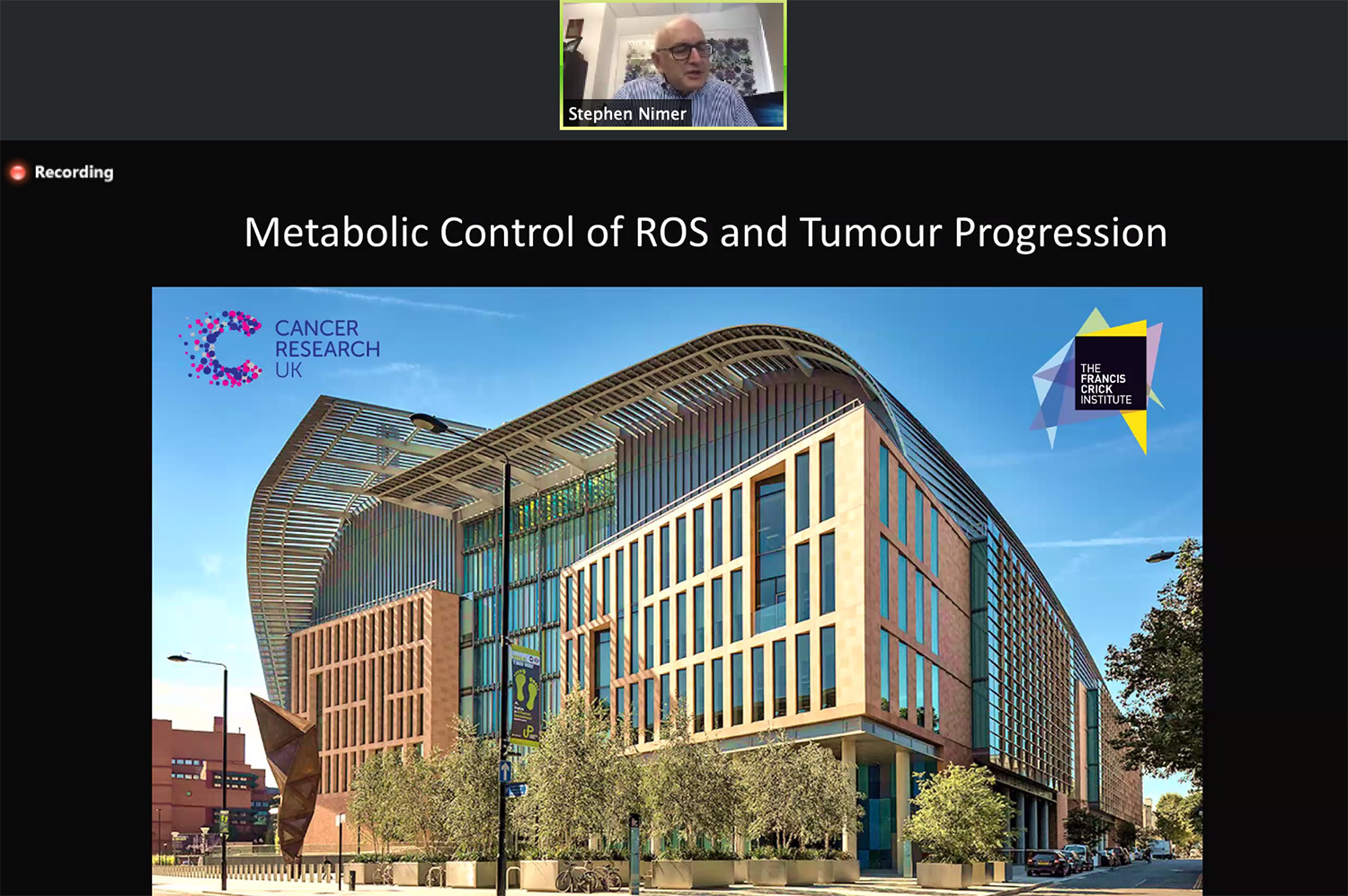
For the past 21 years, Sylvester has hosted the Zubrod Memorial Lecture on the medical campus, in honor of Charles Gordon Zubrod, M.D., the founding director of the University of Miami Cancer Center. The annual Outstanding Faculty Awards are also presented at this event.
This year’s lecture and awards presentation, which took place on May 15, were virtual because of the COVID-19 pandemic.
Sylvester Director Stephen D. Nimer, M.D. started the online presentation by announcing the six recipients of the 2020 Outstanding Faculty Awards.
Basic Scientist: Izidore S. Lossos, M.D.
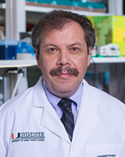 The focus of Dr. Lossos’ research is pathogenesis of lymphoma, identification of molecular prognostic markers and elucidation of their role in lymphoma pathogenesis and in determination of response to therapy, and development of new lymphoma therapies.
The focus of Dr. Lossos’ research is pathogenesis of lymphoma, identification of molecular prognostic markers and elucidation of their role in lymphoma pathogenesis and in determination of response to therapy, and development of new lymphoma therapies.Clinical Researcher: Carmen Calfa, M.D.
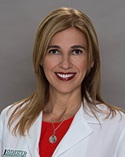 Dr. Calfa’s main contribution in clinical research this year was securing Sylvester’s position as Florida’s sole participating site for the ASCO precision medicine clinical trial Targeting Agent and Profiling Utilization Registry (TAPUR). She also serves as the site’s principal investigator for TAPUR.
Dr. Calfa’s main contribution in clinical research this year was securing Sylvester’s position as Florida’s sole participating site for the ASCO precision medicine clinical trial Targeting Agent and Profiling Utilization Registry (TAPUR). She also serves as the site’s principal investigator for TAPUR.Population Science Researcher: Frank J. Penedo, Ph.D.
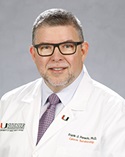 Dr. Penedo is an internationally recognized expert in cancer survivorship and psychosocial oncology. His work involves translational research in symptom and toxicities monitoring and management, patient reported outcomes, precision oncology, and implementation of evidence-based behavioral interventions to improve patient- and system-level outcomes.
Dr. Penedo is an internationally recognized expert in cancer survivorship and psychosocial oncology. His work involves translational research in symptom and toxicities monitoring and management, patient reported outcomes, precision oncology, and implementation of evidence-based behavioral interventions to improve patient- and system-level outcomes.Mentor - Junior Faculty: Joseph D. Rosenblatt, M.D.
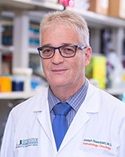 Many of Dr. Rosenblatt’s former trainees have achieved national recognition at the University of Miami, Yale University, Washington University in St. Louis, Memorial Sloan Kettering Cancer Center, Moffitt Cancer Center, and other prestigious institutions. Dr. Rosenblatt has presided over continuous recruitment and expansion of the hematology-oncology faculty.
Many of Dr. Rosenblatt’s former trainees have achieved national recognition at the University of Miami, Yale University, Washington University in St. Louis, Memorial Sloan Kettering Cancer Center, Moffitt Cancer Center, and other prestigious institutions. Dr. Rosenblatt has presided over continuous recruitment and expansion of the hematology-oncology faculty.Mentor - Trainees: Jonathan H. Schatz, M.D.
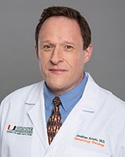 Dr. Schatz works with the members of his own research laboratory and trainees throughout the Miller School as Aim Leader within Sylvester and a member of the Cancer Biology Graduate Program and Medical Science Training Program steering committees.
Dr. Schatz works with the members of his own research laboratory and trainees throughout the Miller School as Aim Leader within Sylvester and a member of the Cancer Biology Graduate Program and Medical Science Training Program steering committees.Teacher: Pryamvada Rai, Ph.D.
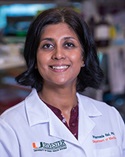 Dr. Rai directs the innovative Cancer Biology flagship graduate course CAB 710 and teaches a range of graduate and medical school classes on tumor biology. She is also the director of the Medical School Summer Undergraduate Research Fellowship (SURF) program, which provides scientific research opportunities and teaches professional skills to disadvantaged and minority students from around the country.
Dr. Rai directs the innovative Cancer Biology flagship graduate course CAB 710 and teaches a range of graduate and medical school classes on tumor biology. She is also the director of the Medical School Summer Undergraduate Research Fellowship (SURF) program, which provides scientific research opportunities and teaches professional skills to disadvantaged and minority students from around the country.Lifetime Achievement Award
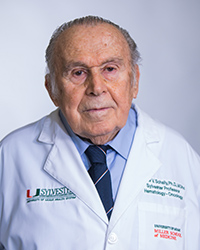
This year’s Lifetime Achievement Award was given to Andrew Schally, Ph.D., whose research and discoveries laid the foundation for modern endocrinology. As an endocrine oncologist and the discoverer of hypothalamic hormones, he was a co-recipient of the Nobel Prize in Physiology or Medicine in 1977 for his work in neuroendocrinology. He has authored and co-authored more than 2,400 scientific publications in the field of endocrinology and oncology.
Dr. Schally has held many roles at the University of Miami including Distinguished Leonard M. Miller Professor of Pathology, professor in the Department of Medicine’s Division of Hematology/Oncology, and director of the Endocrine, Polypeptide and Cancer Institute and Distinguished Medical Research Scientist at the Veterans Administration Medical Center in Miami.
The 2020 Distinguished Lecturer was Karen Vousden, Ph.D., chief scientist of Cancer Research UK and senior group leader at the Frances Crick Institute. She is a Fellow of the Royal Society, the Royal Society of Edinburgh, the Academy of Medical Sciences and the European Academy of Sciences.
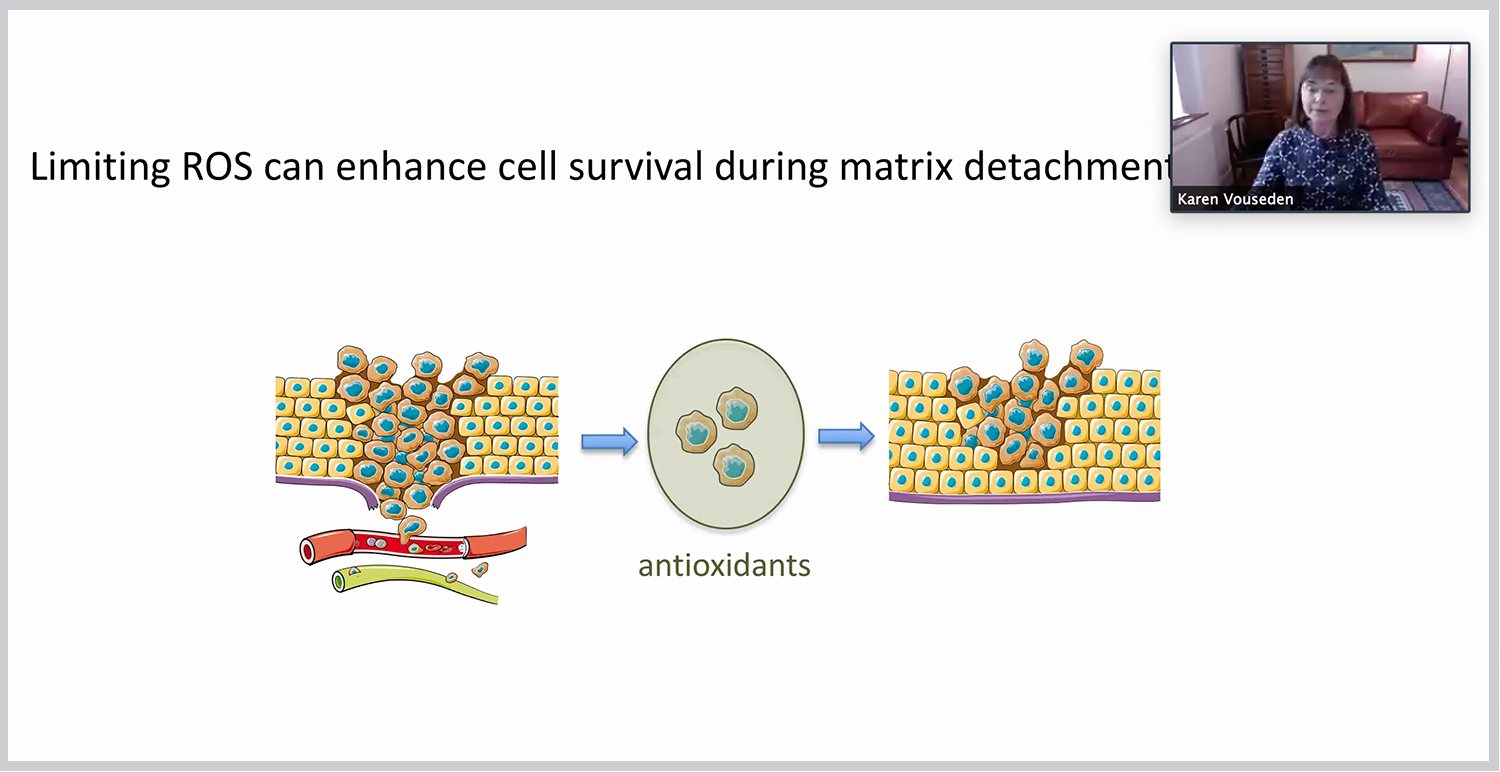
Dr. Vousden's presentation streamed live from London. Her research has focused on the tumor suppressor protein p53, how it works to control cancer progression, and how mutations in this gene actually help promote cancer development. Her research also includes exploring the role of oxidative stress and the effects of serine and glycine dietary restriction.
“Unfortunately, due to the COVID-19 pandemic, we were unable to meet in person for the Zubrod lecture or to give out faculty awards,” Dr. Nimer said. “Nonetheless, we heard a fantastic lecture on the cell’s response to oxidative stress, which was followed by many probing questions, from a very engaged audience. With so many students, faculty members and members of the Zubrod family on the teleconference call, it was a great day for Sylvester and the Miller School of Medicine.”